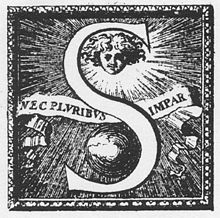- Nec pluribus impar
-
Nec pluribus impar (literally: "Not unequal to many") is a Latin motto adopted by Louis XIV of France from 1658.[1] It was often inscribed together with the symbol of the "Sun King": a head within rays of sunlight.
Meaning
While the motto relates to the allegory of the "Sun King",[2][3] its precise meaning is obscure.[4][5] Philip F. Riley calls it "almost untranslatable".[3] Historian Henri Martin called it "very pompous and, above all, obscure and perplexing".[6] Louvois, Louis' War Secretary, interpreted it as seul contre tous — "alone against all";[4] lexicographer Pierre Larousse suggested au-dessus de tous (comme le soleil) — "above all (like the sun)".[4] John Martin says "[Louis'] matchless splendour was expressed by the motto Nec Pluribus Impar - not unequal to many suns."[7]. Yves-Marie Bercé gives Suffisant (seul) a tant de choses ("Sufficient (alone) for so many things") or Tout lui est possible ("Everything is possible for him").[8] Louis himself wrote:[5]
"Those who saw me managing the cares of royalty with such ease and with such confidence induced me to add [to the image of the sun] the sphere of the earth, and as its motto NEC PLURIBUS IMPAR, by which they meant to flatter the ambitions of a young king, in that with all my capacities, I would be just as capable of ruling still other empires as would the sun of illuminating still other worlds with its rays. I known that some obscurity has been found in these words, and I have no doubt that the same symbol might have suggested some happier ones. Others have been presented to me since, but this one having already been used in my buildings and in an infinite number of other things, I have not deemed appropriate to change it".—Louis XIV, 1662.[1]Origin and use
The first use of the motto and symbol is usually given as the great Carrousel of 1662, in what is now the Place du Carrousel, to celebrate the birth of his son Louis, the Dauphin.[6] However, the motto appeared as early as 1658 on a medal.[2] Voltaire attributes the motto and emblem to Louis Douvier, who derived them from a device of Philip II of Spain, of whom it was said the sun never set on his dominions.[4] Polemicists in the Spanish Netherlands pointed out the unoriginal nature of the symbol.[4] Louis XIV himself was not enamoured of them, but they proved popular with the public and so he tolerated them.[4][5]
The motto and sun-king device appeared on many buildings, as well as on cannons. The classical de Vallière guns in particular bear the motto and the symbol, even for those founded long after Louis XIV's death.
Many of Louis' subordinates adopted emblems and mottos playing off those of the sovereign. César de Beaufort, Admiral of France, adopted a moon with motto Elle obéit au soleil et commande aux flots ("It obeys the sun and commands the seas"); Duc de Sully adopted a burning-mirror with motto Je brûle sous son regard ("I burn [under its gaze / at his command])".[9]
It is the motto of Ribét Academy, a private preparatory school in Los Angeles, and the 1st Foreign Cavalry Regiment of the 6th light armored brigade of the French Army.
References
- ^ a b The palace of the sun: the Louvre of Louis XIV Robert W. Berger, p.15 [1]
- ^ a b Berger, Robert W. (1993). The Palace of the Sun: The Louvre of Louis XIV. Penn State Press. p. 15, fn.22. ISBN 0271008474. http://books.google.com/?id=uJC4hE2SgncC&pg=PA15&dq=%22Nec+Pluribus+Impar%22#PPA15,M1.
- ^ a b Riley, Philip F. (2001). A lust for virtue: Louis XIV's attack on sin in seventeenth-century France. Greenwood Publishing Group. p. 25. ISBN 0313317089. http://books.google.com/?id=LOCQe_39FiAC&pg=PA25&dq=Not+unequal+to+many+suns.
- ^ a b c d e f Tiedeman, H. (29 February 1868). "The French King's Device: "Nec Pluribus Impar" (3rd Ser. xii. 502)". Notes and Queries: 203–4. http://books.google.com/?id=z0oAAAAAYAAJ&pg=PA203&dq=%22don+carlos%22+%22Die+Sonne+geht+in+meinem+Staat+nicht+unter%22. Retrieved 2009-05-14.
- ^ a b c Louis XIV (1970) [1662]. Louis xiv King of France and of Navarre : Memoires for the instruction of the Dauphin. introduction, translation, and notes by Paul Sonnino. New York: Free Press. p. 104. OCLC 254475643.; quoted in Berger.
- ^ a b Martin, Henri; Henri Martin (historian) (1865). "Vol 1, Chp 4". The Age of Louis XIV. Martin's History of France. Part VII. translator Mary Louise Booth. Boston: Walker, Wise and co.. p. 149, fn.1. OCLC 1844549. http://books.google.com/?id=nW0PAAAAYAAJ&pg=PA149&dq=%22Nec+Pluribus+Impar%22. Retrieved 2009-06-14.
- ^ Martin, John Rupert (1977). Baroque. Harper & Row. p. 242. ISBN 006435332X.
- ^ Bercé, Yves-Marie (2005) (in French). Louis XIV. Le Cavalier Bleu. p. 5. ISBN 2846701229. http://books.google.com/?id=Rrdk2vGNc4sC&pg=PA5&dq=+%22Nec+pluribus+impar%22#PPA5,M1.
- ^ Millington, Ellen J. (1858). Heraldry in history, poetry, and romance. London: Chapman and Hall. p. 309. http://books.google.com/?id=jPRsAAAAMAAJ&pg=PA309&dq=%22Nec+Pluribus+Impar%22.
Categories:- Louis XIV of France
- Latin mottos
- Latin political phrases
Wikimedia Foundation. 2010.


